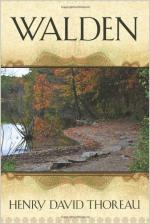|
|
Walden The Bean-Field
In the midst of all his philosophizing, he realized that all his bean rows would stretch seven miles when placed end-to-end. What was most amazing was the fact that he was getting beans from soil that had never before yielded beans. Still, it was sad that he had to do so much weeding of other, mostly native, plants to yield the beans. Thoreau realized that the land had been cleared about 15 years previous to him moving there, and there were still a lot of stumps stuck in the ground. He didn't fertilize the ground, but hoed it a lot instead, which he felt made up for the lack of nutrients. However, he found some arrowheads in his digging, which made him think that Indians had planted beans here long ago, and that they knew the soil was good for growing beans. Growing his beans was Thoreau's "daily work."
"When my hoe tinkled against the stones, that music echoed to the woods and the sky, and was an accompaniment to my labor which yielded an instant and immeasurable crop. It was no longer beans that I hoed, nor I that hoed beans; and I remembered with as much pity as pride, if I remembered at all, my acquaintances who had gone to the city to attend the oratorios." The Bean-Field, pg. 147
Sometimes, in the afternoons, a night-hawk would fly overhead. Thoreau felt the bird was answering to the sea, and that the air was to it like water is to a fish. He was taken by its beauty and skill, and its back and forth trips through the air- like his thoughts.
Twice a year, Thoreau was disturbed in his bean-field by the blast of the guns from Concord. They were shot in honor of the Battle of Concord that started the Revolutionary war, and Independence Day. He senses, on those days, that a disease is about to break out in the area. He expresses sarcastic hope about feeling secure in Massachusetts when the guns go off. He is even more scathing in regards to the military bands that are supposed to inspire chivalry, which Thoreau merely likens to violence. However, he can find no difference in the sky on those days, which is a relief. Nature is not bothered by the guns.
There are so many steps to growing beans, and Thoreau had the opportunity to become intimately acquainted with each one, from hoeing the rows to harvesting and eating them. By the end of the summer, he knew the beans because of his work on every step of growing them. It turned out that he also knew the weeds at that point, too. Although he took a few of his beans to eat, they weren't a part of his diet. Instead, he traded them for rice; 12 bushels of beans in all.
Thoreau then imparts advice on how to raise beans best in New England. He also discovers, during his second summer, that beans did not re-seed themselves. They die or get eaten over the winter. Now that Thoreau is done talking about cultivating beans, he goes on to children. Should we not take care in raising the next generation, he asks? We should cultivate the same qualities in children - strength, health, and so on.
Husbandry (the science of farming and agriculture) is Thoreau's next subject. It used to be considered (in Greek and Roman times) a sacred profession. It was practiced not only to sell food for profit, but as an exercise in growing and working with the earth. Along these lines, Thoreau sees that he can rejoice that his beans are food for the woodchucks as much as for people, and that the growth of the weeds is as important as that of the beans.




